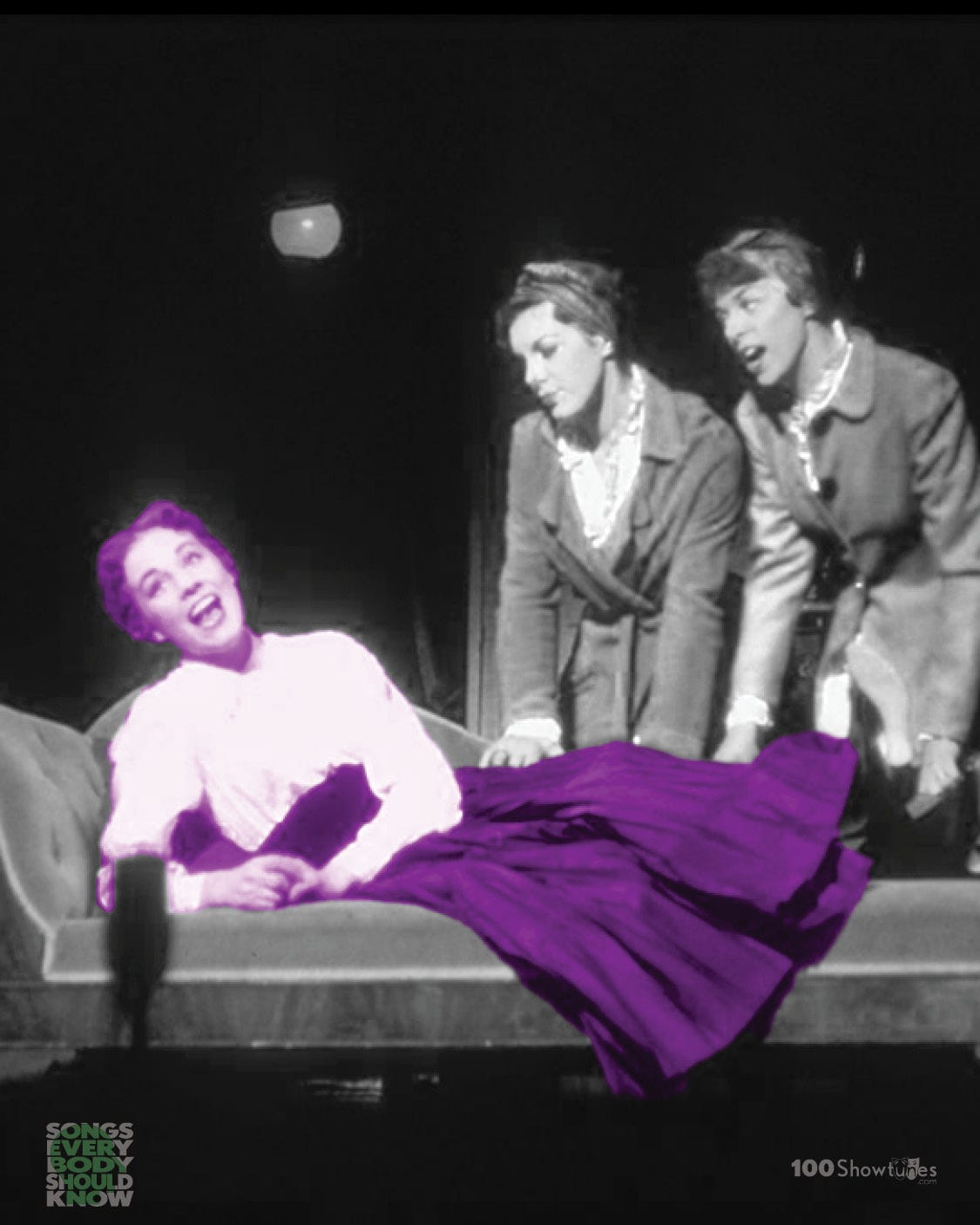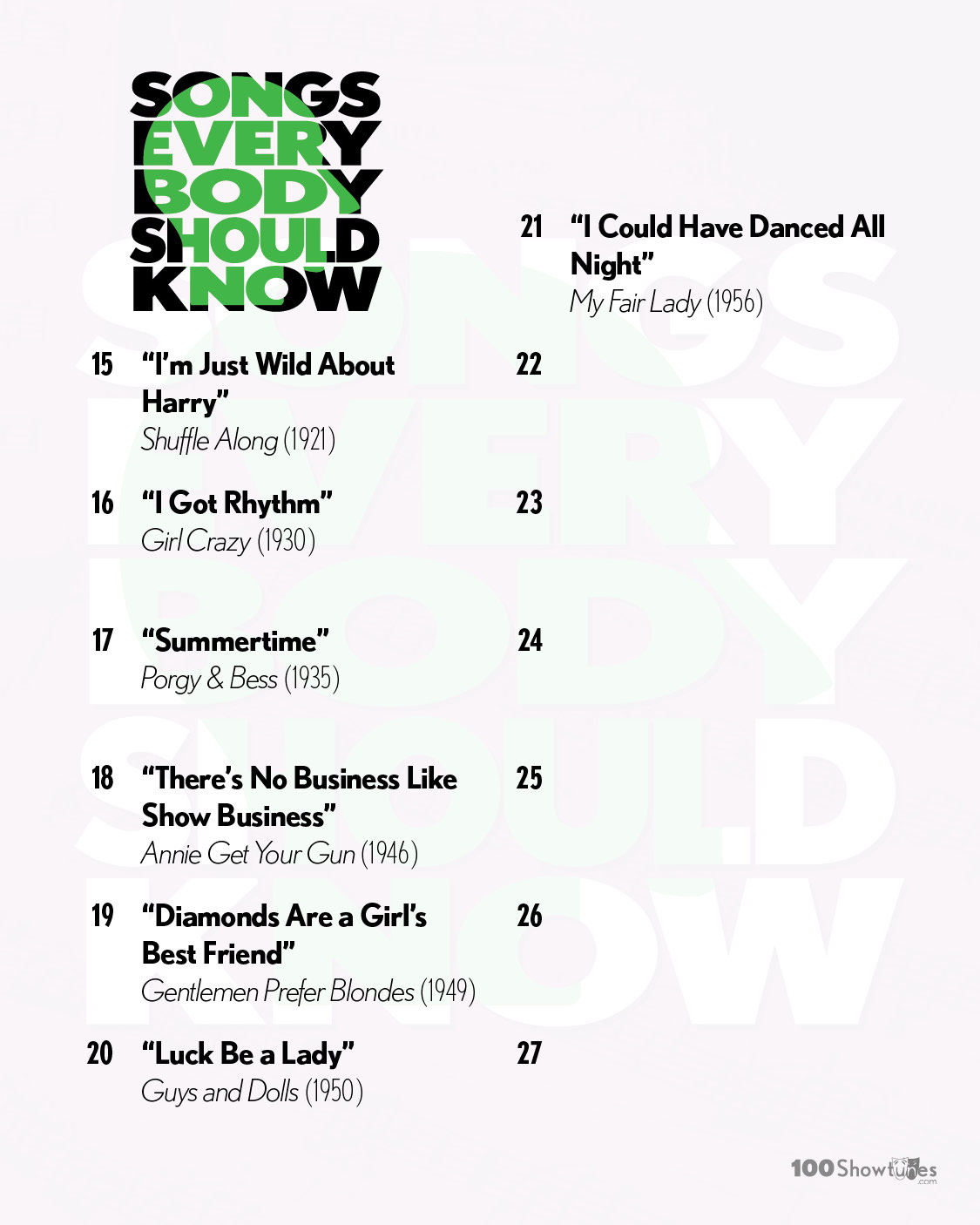No. 21. “I Could Have Danced All Night”
MY FAIR LADY (1956). By Frederick Loewe (music) and Alan Jay Lerner (lyrics and book). Adapted from PYGMALION by George Bernard Shaw
Spring 1956. You’re at the smash hit musical My Fair Lady. After a thrilling overture, the curtain rises on London’s Covent Garden, 1912. You meet Henry Higgins, a linguistic expert played by Rex Harrison, who leads an opening number that is his diatribe against informal dialects. Rex can’t really carry a tune, so he sing-speaks, which seems to work for his intellectual and brusque character. Higgins encounters a cockney flower girl named Eliza Doolittle, played by newcomer Julie Andrews, whose dialect particularly offends Higgins’ ear. And he tells her as much. When he leaves, Eliza gets a lovely number in which she dreams of a more comfortable upperclass life, and she’s the opposite of Higgins in every way—warm, open, and with a beautiful signing voice. The whole show is quite literate and classy, with a glorious score by Frederick Loewe and Alan Jay Lerner that keeps it from becoming too didactic. Eliza show’s up at Higgins’ place, hoping to take English lessons so she get can a proper job at a flower shop. Higgins decides to make a get with his friend Col. Pickering: that Higgins can give Eliza a linguistic makeover and pass her off as a society lady. Eliza moves into Higgins’ home and begins undergoing grueling training exercises until, late one night, everything clicks and she has a breakthrough. When she says “the rain in Spain stays mainly in the plain” in a somewhat proper accent, she, Higgins, and Pickering launch into a joyous celebration and dance. The men head off to bed, leaving Eliza still in her reverie. While the (unnecessarily large) housekeeping staff urges Eliza to go to sleep, she reflects on the evening’s success and warming feelings towards Higgins in “I Could Have Danced All Night.”
Who would imagine that a wordy musical adaptation of a George Bernard Shaw play would not just be successful but would become, for a time, the longest running musical in Broadway history? Certainly not Shaw, who refused to allow an adaptation of Pygmalion in his lifetime—though once he passed in 1950, it became open season. Rodgers and Hammerstein tried to adapt it and determined it couldn’t be done—there’s no real central romance, no secondary plot…just a a lot of intellectual discourse on the intersection of dialect and class. But Lerner and Loewe found a the beating heart underneath the didacticism that allowed the characters to sing. No song better encapsulates this ability to find emotion in the subtext than “I Could Have Danced All Night.” Its tidy 32-bar refrain perfectly expresses Eliza’s giddy rapture at her first success towards becoming a lady, with an ending line—“I only know when he became to dance with me / I could have danced, danced, danced all night”—that hints at softening feelings towards Higgins…without quite turning it into a full-fledged romance. It’s also insanely catchy (no doubt helped by the fact that Eliza basically sings the song three times in a row). The counterpoint sung by the maids during the second verse is one of the most delightful passages in all of musical theater.
Recommended Recording: ”I Could Have Danced All Night,” My Fair Lady (1956 Original Broadway Cast)
The original Broadway cast recording of My Fair Lady bumped Elvis Presley from the number one spot on the charts and became the best selling album of 1957 and 1958. It made Julie Andrews a superstar, and I personally don’t think she’s ever sounded better than she does here.
Alternate Performances
My Fair Lady has received ~76 cast recordings. The 1959 Original London Cast recording (the green one) features pretty much all of the same leads, but recorded in stereo. It has been certified 3X platinum and is tied as the 5th best selling cast-recording of all time. (I still prefer Andrews’ performance on the OBCR). A slew of international recordings includes Argentinian, Brazilian Czech, Danish, Dutch, French, German, Hungarian, Israeli, Italian, Mexican, Peruvian, Portugeuse, Russian, Spanish, and Swedish. There’s also a “roaring twenties” version, a “Let’s Twist to the Music of…” edition, and recordings by pretty much any group that is “[Conductor’s Name] and his Orchestra.”
1964 Film - The 1964 film was a massive success that helped usher in a decade of big extravagant film musicals released as premium “road shows.” Rex Harrison and many of the supporting players from Broadway and London got to repeat their performances here. Julie Andrews, famously, did not, with Audrey Hepburn playing Eliza (and Marnie Nixon providing the singing, though Hepburn recorded her own as well). Andrews instead starred in the year’s other smash hit road show musical, Mary Poppins, winning an Oscar. Director George Cukor spends an awful lot of time panning over flowers and creating tableaus for a musical that ain’t short to begin with, but it still ranks as one of the finest stage to screen transfers.
2001 London Cast - Trevor Nunn directed this acclaimed and popular revival starring Jonathan Pryce and former pop star Martine McCutcheon. She caused a sensation in the role, though she frequently missed performances and hasn’t had a major stage role since. You probably know her as Hugh Grant’s secretary/love interest in Love, Actually.
2018 Broadway Revival - The whole notion of an implied romance between Eliza and Henry was a little bit beyond Shaw’s intentions. At the musical’s end, Higgins realizes how much Eliza means to him just as she develops her own sense of agency. He sits in his empty apartment realize how lonely it is without her only for her to return as the curtain falls. (This ending first appeared in a popular 1938 movie version for Pygmalion, and that film’s producer led the charge for its musicalization, literally over Shaw’s dead body.) It’s not an offensive ending, but in undercuts Eliza’s growth. Shaw went so far as to respond to the 1938 film with write an essay in which he describes Eliza’s future without returning to her arrogant tutor. The 2018 Broadway Revival directed by Bartlett Sher addressed this by staging Eliza’s final return as a fantasy in Higgins’ head. I don’t know that the solution fully makes sense on its own outside of the larger conversation that has surrounded the piece for decades, but it allowed the production to change the ending without changing the text.
Is it Covered by The Rat Pack, Audra McDonald, or Glee?
The Rat Pack: Frank Sinatra recorded three songs from My Fair Lady, beginning with “I Could Have Danced All Night” in 1958, followed by “I’ve Grown Accustomed to Her Face” in 1962, and “Get Me to the Church on Time” in 1966. Sammy Davis Jr. recorded “The Rain in Spain” and “I’ve Grown Accustomed to her Face.”
Audra McDonald has performed “I Could Have Danced All Night” in concert for years, typically inviting the audience to sing along. She recorded it on her Sing Happy album as well as as her 2024 special Audra McDonald at the London Palladium. Yes, this is the 4th time this special has come up so far. Support your local PBS station!.
Glee features “I Could Have Danced All Night” in Glee season 1 episode 8 (“Mash-Up”). Emma sings it as she thinks about Will Shuster, even as she’s planning a wedding to the gym teacher. “The Rain in Spain” appears in season 3 episode 18 (“Choke”) as a study aid for a “European geography” exam.
In the Wings
Song No. 22 drops next week. Until then, I recommend checking out the 1938 film version of Pygmalion. This specific adaptation of Shaw’s play became the blueprint for My Fair Lady’s libretto, but more to the point, it’s very good!




